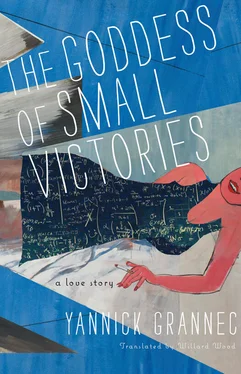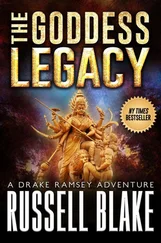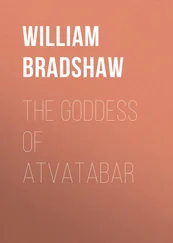“Do you like it? I knitted it myself.”
“I’ve never gotten anything so beautiful. You shouldn’t have gone to all the trouble!”
Anna thought back to the dress she had bought for Thanksgiving: strange how a simple rag can impact your fate. She had let the Frenchman return home without making useless promises and hung the red dress in her closet with her other regrets.
She was impatient to give Adele her own present. She had thought about it hard in the weeks before Christmas and, after an afternoon of wandering the feverish streets of New York, had entered Macy’s where, turning a corner, she came to a full stop in front of a sumptuous bathrobe. She had barely looked at the scandalous price tag; her father’s envelope would be put to good use. She returned to Princeton exulting over her find, with its bronze brocade and cashmere lining. She could easily imagine Mrs. Gödel, triumphantly imperial, in this dressy outfit. Adele let out a breath as she unfolded the robe.
“How splendid! You are not being reasonable, this must have cost you an arm and a leg!”
“Two, if you really want to know. But you will look extraordinarily fine in this housecoat.”
“Housecoat? What will people think up next? I am in shock. It’s much too much.”
“You’re not going to cry, are you?”
They smiled at each other. Gladys spoiled the moment by barging in on them. She had prepared each of them a present. Anna was embarrassed; she’d brought Gladys only a box of chocolates. Preparing herself gamely to go into raptures, she opened the offering, which was wrapped in delightful pink paper. Inside was a container that gave off a sour, unappealing smell. She hugged Gladys without inquiring whether it was fruit preserve or hair tonic. The old lady gave off the same smell. Gladys went back to distributing packages, the huge pom-poms on her sweater bouncing. Adele brandished her own present: an assortment of embroidered handkerchiefs in revolting colors.
“You were lucky.”
“Well, I avoided Elvis Aaron Presley, for one thing. He must have had a concert tonight … up there. And who was that Asakter? I didn’t understand what he said.”
“A wandering soul. Wherever they see an opening, they pounce on it. They are always ruining our séances.”
“You’d think the dead would have better manners.”
“The afterlife is crawling with annoying people. It’s simply a question of concentration. It’s mathematical.”
“Who will we summon to our séance next time? Your husband?”
“He never liked being disturbed at nap time.”
“You don’t wish that you could speak to him again?”
“I would put my hand on his neck. He would bend his head. We didn’t need words.”
Anna took a sip of her horrific sparkling wine, trying hard not to make a face.
“Will you summon me when I have passed to the other side?”
“I’ll leave a window open. In case …”
For a moment she thought the old lady was going to kiss her. A sense of modesty kept them from it at the last moment.
“Merry Christmas, Adele!”
“ Frohe Weihnachten, Fräulein Maria! ”
And she hung a garland around Anna’s neck, as though she were a lovely Hawaiian who had strayed off course.
Cradle and coffin, grave and mother’s breast — our hearts confuse them and, in the end, they almost resemble each other.
— Klaus Mann, The Turning Point
“I’m happy to do that for you.”
“I need to do it myself, sweet girl.”
She gave me a pat on the hand.
“Then I’ll go and prepare afternoon tea!”
Elizabeth went into the kitchen, leaving me with a mountain of papers heaped on the living room rug. I had to find the courage for this last ordeal.
There had been so few of us at his funeral: a few attendants with graying temples, eager for it to be over, supporting a handful of old ladies in black: Dorothy without Oskar, Lili without Erich. The men go first, that’s how it is. Shivering, I clung to Elizabeth’s arm. A long car had brought the casket. Had someone spoken a few touching words? I didn’t remember. The Institute must have coughed up some sort of speech all the same. I remembered practically nothing after the trip to the Kimble Funeral Home. Except for the flowers: I’d thrown red roses onto the coffin before it was covered with earth. Camellia season was over. Since January 19, Kurt had been sleeping under a slab of dark gray marble. My mother was resting a few feet away. She wouldn’t bother him; she’d always slept like the dead.
Elizabeth returned with the tea tray. We drank a cup of tea and nibbled on biscuits, listening to the merry crackling in the fireplace, already tired from the effort ahead.
“How do you want to do this, Adele?”
“We need to pay careful attention to chronological order. Some of the boxes are already labeled. Otherwise, Kurt left no specific instructions. Except about the stamps. Rudolf is supposed to sell them. He’d probably like to sell the entire archive, but I’m not going to let him do that.”
“And for everything else?”
“I’ll sort. You file.”
“Seeing this pig’s breakfast, no one would guess that your husband was as meticulous as I remember him!”
“He kept everything. He must have found some logic in it.”
A last housecleaning for Kurt. It’s the only thing I ever did for him throughout my life. Putting the world in order to keep that damned entropy from swallowing him up. Do all women share the same fate? We mate out of love or a need for security, only to wind up keeping afloat the one who’s meant to be a rock. Is that what happens to all of us? These brothers, fathers, lovers, friends — are we there to fish them out when they go down? Is that the cockeyed reason God gave us breasts and hips? Are we no more than flotation devices? What is left to us afterward, when there is no longer anyone to save?
Putting the memories away.
“When it isn’t his illegible scrawl, it’s written in stenographer’s shorthand. It’s going to drive me crazy.”
“You should get a little rest, Adele. We’ve been at it for three days. It can wait a little longer.”
“I prefer to get it done. These scribbles were important to him.”
The sorting wasn’t going forward. I couldn’t reach into these papers without pulling out a piece of the past: a photograph, a note in his handwriting, a newspaper clipping. No one could have resisted this toxic drip of nostalgia. It wasn’t an inventory but the autopsy of a life.
Kurt had died rolled up in a ball on the chair of his hospital room. Alone.
What did he think about before letting go? Who did he think about? Did he call out to me? Did he reproach me for not being there? The one time that I didn’t come running. Only my body, this grotesque vessel, was at fault. My body had put me in prison. The moth had gone back to being a caterpillar. A huge larva, without arms to enfold my man one last time, without a voice to tell him, “It’s nothing, Kurtele. It’ll pass. A spoonful for the road, please.”
Did he die of malnutrition as they said? No, it was more a work-related accident: he was looking into uncertainty; he died riddled with doubt. He was the doctor who, investigating his own pathology, discovers that it can never be cured. Life is not an exact science, everything about it is fluctuating, unprovable. He couldn’t verify it parameter by parameter. He couldn’t axiomatize existence. What had he searched for that wasn’t in his heart, his bowels, or his sexual organ? He had decided not to involve himself, to place himself outside the world to understand it. There are systems from which we can’t exclude ourselves. Albert knew it. To exclude yourself from life is to die.
Читать дальше












